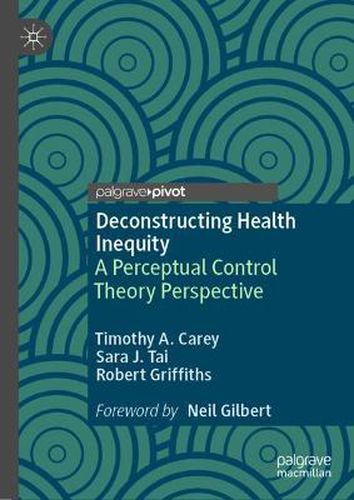Readings Newsletter
Become a Readings Member to make your shopping experience even easier.
Sign in or sign up for free!
You’re not far away from qualifying for FREE standard shipping within Australia
You’ve qualified for FREE standard shipping within Australia
The cart is loading…






This title is printed to order. This book may have been self-published. If so, we cannot guarantee the quality of the content. In the main most books will have gone through the editing process however some may not. We therefore suggest that you be aware of this before ordering this book. If in doubt check either the author or publisher’s details as we are unable to accept any returns unless they are faulty. Please contact us if you have any questions.
This book offers a radically different perspective on the topic of health inequity. Carey, Tai, and Griffiths use Perceptual Control Theory (PCT) to deconstruct current approaches to understanding, investigating, and addressing problems of health inequity. In the book, the authors propose that health inequity is not a problem per se. Disrupted control, they argue, is the problem that needs to be addressed.
From this perspective, research, policy, and health practices directed at addressing health inequity in isolation will offer only partial solutions to the problems created by disrupted control. Addressing problems of disrupted control directly, however, has the potential to entirely resolve issues that are created by health inequity.
The authors have extensive clinical and research experience in a wide range of contexts, including: cross-cultural settings; rural, remote, and underserved communities; community mental health settings; prisons; schools; and psychiatric wards. Drawing on these diverse experiences, the authors describe how adopting a Perceptual Control Theory perspective might offer promising new directions for researchers and practitioners who have an interest in addressing issues of inequity and social justice. With a Foreword written by Professor Neil Gilbert this book will provide fresh insights for academics, practitioners, and policymakers in the fields of public health, psychology, social policy, and healthcare.
$9.00 standard shipping within Australia
FREE standard shipping within Australia for orders over $100.00
Express & International shipping calculated at checkout
This title is printed to order. This book may have been self-published. If so, we cannot guarantee the quality of the content. In the main most books will have gone through the editing process however some may not. We therefore suggest that you be aware of this before ordering this book. If in doubt check either the author or publisher’s details as we are unable to accept any returns unless they are faulty. Please contact us if you have any questions.
This book offers a radically different perspective on the topic of health inequity. Carey, Tai, and Griffiths use Perceptual Control Theory (PCT) to deconstruct current approaches to understanding, investigating, and addressing problems of health inequity. In the book, the authors propose that health inequity is not a problem per se. Disrupted control, they argue, is the problem that needs to be addressed.
From this perspective, research, policy, and health practices directed at addressing health inequity in isolation will offer only partial solutions to the problems created by disrupted control. Addressing problems of disrupted control directly, however, has the potential to entirely resolve issues that are created by health inequity.
The authors have extensive clinical and research experience in a wide range of contexts, including: cross-cultural settings; rural, remote, and underserved communities; community mental health settings; prisons; schools; and psychiatric wards. Drawing on these diverse experiences, the authors describe how adopting a Perceptual Control Theory perspective might offer promising new directions for researchers and practitioners who have an interest in addressing issues of inequity and social justice. With a Foreword written by Professor Neil Gilbert this book will provide fresh insights for academics, practitioners, and policymakers in the fields of public health, psychology, social policy, and healthcare.